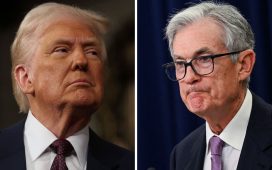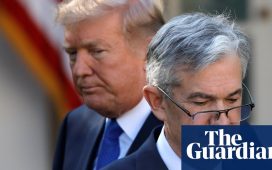Receive free War in Ukraine updates
We’ll send you a myFT Daily Digest email rounding up the latest War in Ukraine news every morning.
US president Joe Biden pledged to supply additional air defence systems and cluster munitions to Ukraine after meeting Volodymyr Zelenskyy on Thursday in Washington, a bid to keep backing the Ukrainian war effort despite mounting Republican opposition in Congress.
The package announced on Thursday will include more artillery, ammunition, anti-tank weapons, cluster munitions, a second Hawk air defence battery, and launchers and interceptors. It is valued at $325mn, and comes from money Congress had already approved to last until the end of September.
Although the new package will not include the provision of the ATACMS long-range missile system sought by Kyiv, the Ukrainian president was upbeat about receiving more American support.
“It has exactly what our soldiers need now,” Zelenskyy said after what he said was a productive meeting with Biden.
“Mr President, we’re with you, we’re staying with you,” Biden told Zelenskyy. “We stand with Ukraine and will continue to stand with you.”
The extra package announced from the White House comes as Washington grows increasingly divided about providing more aid to Ukraine, with House Republicans and some of the party’s senators seeking to block a request from the White House to Congress for another $24bn worth of assistance for Kyiv.
The meeting with Biden came hours after Zelenskyy briefed the full 100-member US Senate in a closed-door meeting. He held a smaller briefing with Republican House Speaker Kevin McCarthy and a handful of senior Republicans and Democrats from the lower chamber.
McCarthy, under mounting pressure from the isolationist flank of his party that is seeking to block more aid for Ukraine, declined Zelenskyy’s request to deliver an address this week to a joint session of Congress — an honour that was extended to him last year.
“We just didn’t have time,” McCarthy told reporters on Thursday morning. “He’s already given a joint session. What we are doing for Zelenskyy is exactly the same thing we did for the prime minister of the UK, the prime minister of Italy.”
“This is a little busy week. We are dealing with the funding issue. I don’t know how we could slip that in, in such a short time,” McCarthy added.
Chuck Schumer, the Democratic Senate majority leader, said late Wednesday after a classified briefing with the Biden administration’s top military and security officials that the looming government shutdown could significantly impact Ukraine’s war effort.
“It is very clear that if we were to have a government shutdown, or to pass a [continuing resolution] with no Ukraine aid, that the effect on Ukraine would be very quick and devastating,” he said.
Schumer doubled down on Thursday after meeting Zelenskyy, telling reporters: “I am quoting him verbatim, Mr Zelenskyy said: ‘If we don’t get the aid, we will lose the war.’ That’s a quote from him.”
Before Zelenskyy arrived in Washington on Thursday, nearly 30 Republican lawmakers wrote to the White House to reject the $24bn funding request.
“The American people deserve to know what their money has gone to,” they wrote in the letter, led by senator JD Vance and congressman Chip Roy. “What is our strategy, and what is the president’s exit plan?”
Their letter underscored the widening divide in the Republican party over Ukraine. Mitch McConnell, the Senate’s top Republican, has urged the US to provide more weapons and funding to Kyiv.
Michael McCaul, the Republican chair of the House foreign affairs committee, said after meeting Zelenskyy on Thursday that the US should “get them everything they need”, including long-range missiles.
“There are a lot of political machinations right now, but I assure you we are going to get it passed,” he added, referring to the White House’s funding request.
Biden on Thursday said he hoped Congress would see the request through.
“I’m counting on the good judgment of the United States Congress. There is no alternative,” Biden said.
The decision to continue to hold off on ATACMS reflects Washington’s fears that they could be used to strike deep into Russian territory, as well as a desire to preserve a stockpile of the weapons amid mounting tensions between the US and China over Taiwan.
“The president is constantly speaking both to his own military and to his counterparts in Europe and to the Ukrainians themselves, about what is needed on the battlefield,” national security adviser Jake Sullivan said, adding that Biden also considers the US military’s own needs.
He added: “As he’s weighed all that up to date, he has determined that he would not provide ATACMS, but he has also not taken it off the table in the future.”







